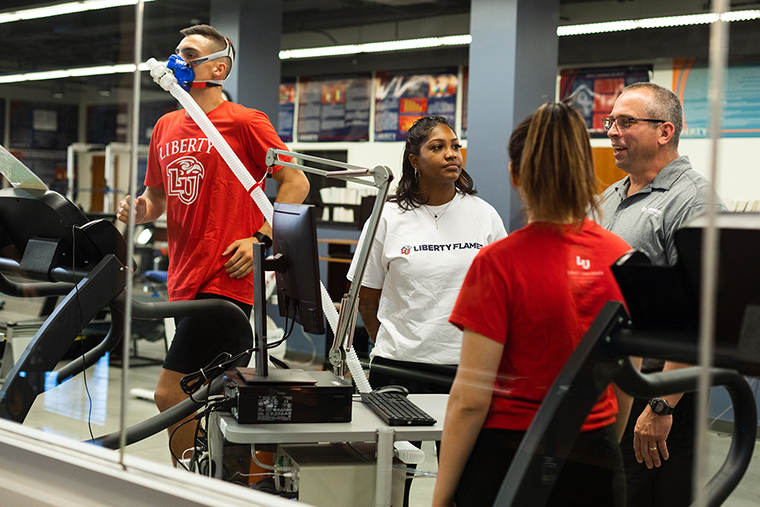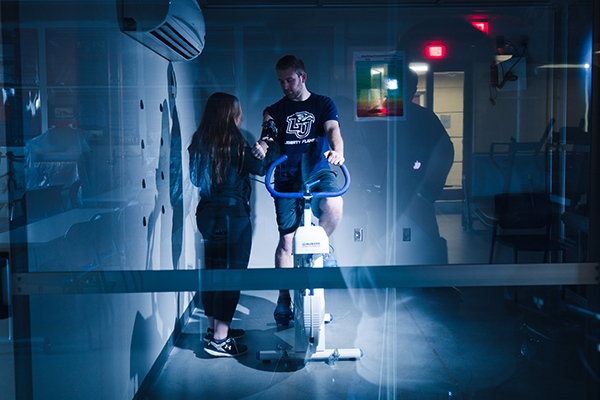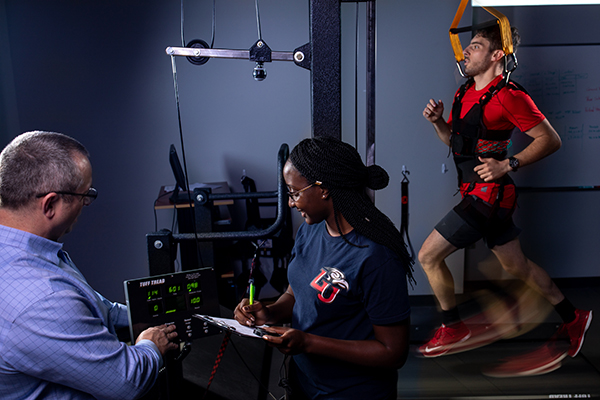Search News Archives
Filter News Articles
Additional Navigation
Liberty’s exercise science program emerging as national model
November 22, 2019 : By Ted Allen - Office of Communications & Public Engagement
 A recent meeting with the American College of Sports Medicine (ACSM) confirmed that Liberty University’s exercise science program is setting the standard for other programs across the United States.
A recent meeting with the American College of Sports Medicine (ACSM) confirmed that Liberty University’s exercise science program is setting the standard for other programs across the United States.
“Liberty’s program excels at meeting three objectives: education, success on certification exams, and practical experience,” said Dr. Francis Neric, National Director of Certification for ACSM. “What Liberty does wonderfully is linking the three together. This holistic approach is very unique to Liberty, and we would like to use it as a benchmark for other institutions to follow.”
Dr. Jim Schoffstall, chair of the Allied Health Professions department under the School of Health Sciences, recently spoke with Neric and a team from the ACSM. “They were very interested to know how we train and prepare our students with regards to our curriculum and materials utilized,” he said. “They also asked for assistance in the development and refining of ACSM certification materials.”
Liberty’s exercise science students are passing the ACSM’s Exercise Physiologist Certification Exam at a rate of more than 90 percent.
“The ACSM considers our program to be the gold standard of exercise science programs. They would like to see Liberty’s model used by every university, so that’s a big compliment to our program,” Schoffstall said.
Liberty offers a residential Bachelor of Science in Exercise Science, which is nationally accredited by the Commission on Accreditation of Allied Health Education Programs (CAAHEP). It also offers residential and online graduate programs in exercise science and human performance.
 Approximately 500 undergraduate students are currently enrolled — choosing from three specializations: fitness specialist, strength and conditioning, or therapeutic sciences. The programs are also designed for students who plan to go to graduate school to become physical or occupational therapists, physician assistants, or chiropractors. About 200 students are currently seeking master’s degrees.
Approximately 500 undergraduate students are currently enrolled — choosing from three specializations: fitness specialist, strength and conditioning, or therapeutic sciences. The programs are also designed for students who plan to go to graduate school to become physical or occupational therapists, physician assistants, or chiropractors. About 200 students are currently seeking master’s degrees.
Nearly 95 percent of Liberty’s graduates are being placed in their chosen professions, according to a 2017 alumni survey.
Practicing what they teach equips Liberty’s exercise science professors to better train their students.
“Our faculty have a broad array of backgrounds,” Schoffstall said. “Dr. (David) Horton is a big cycling, running, ultramarathon guy. Others, like myself, are more into the strength side of things. Then we have Dr. (David) Titcomb, who has a degree in physical therapy; Dr. (Jeff) Lowes with a degree in chiropractic care; and Dr. (Stephen) Eakin, an M.D. So our students who want to go into those programs say, ‘Wow, I have a mentor right here … who can help me get to where they are, too.’”
The faculty members are also authorities in their respective areas. Dr. Will Peveler is a well-known author of books and articles on the exercise science field and is working on a series of six or more “Train Like A Pro” books, geared toward a variety of athletes from cyclists to taekwondo artists; the first three are due to be published in September 2020.
Neric said a critical component to students developing careers in exercise science is active participation in professional organizations. Dr. Andy Bosak, director of Liberty’s graduate exercise science program, said he and his peers lead by example in encouraging students to expand their base of knowledge and apply what they are learning.
“Everybody’s doing something within the community or through organizations,” Bosak said. “Each person in here is working very hard in their field, so it’s the norm. We all love it. We are involved in organizations like the ACSM, the National Athletic Trainers’ Association (NATA), and the National Strength and Conditioning Association (NSCA). It helps us get our students involved and participate in a service to our discipline.”
 Students have access to state-of-the-art athletic training and exercise science, human performance, and physiology labs in the Center for Natural Sciences.
Students have access to state-of-the-art athletic training and exercise science, human performance, and physiology labs in the Center for Natural Sciences.
“We are blessed that when you look at our labs, they compare favorably to big-time research methods, strategies, and projects, rivaling those at places like Auburn University,” Bosak said.
Rather than just reading textbooks and writing papers, students utilize the lab space to put their knowledge into practice and develop expertise to prepare for professional careers.
“Our students get trained on virtually every piece of equipment we have in the lab,” Schoffstall said. “Because some students don’t learn well by lecture, we’ve built hands-on activities in the labs into most of our courses, giving them opportunities that students at other schools don’t have.”
Liberty has only offered a master’s degree in exercise science since 2015, but professors have been introducing their undergraduates to graduate-level research for the past 10 years, he said, adding that exercise science is rapidly developing as a new pathway for students to earn their doctorates.
“All of our students do practicums and internships, and we’ve had a number of master’s students go on to be fully funded in exercise science and physiology Ph.D. programs across the country. They’re very competitive.”
Schoffstall said some students choose exercise science as a basis for medical school.
“We have the ‘exercise is medicine’ mentality and would love to see more aspiring doctors go through the exercise science route. We want to really get exercise more involved in the health and healing process, as opposed to the traditional surgery and medicine.”
Parker Spencer (’12), a former Flames track & field and triathlon team member, applied his exercise science degree by launching his coaching career. After serving as head coach for Liberty’s men’s and women’s triathlon and cycling teams and men’s swimming & diving teams, he is now head of USA Triathlon’s Project Podium, training potential U.S.
Olympic triathletes in Tempe, Ariz.
“I am incredibly thankful for the professors in the exercise science department at Liberty and the conversations I had with them,” Spencer said. “I use my exercise science background every day in analyzing athletes. Dr. Horton’s exercise physiology course really got me thinking about how to apply that into endurance training. Through hundreds of tests in the exercise science labs, I learned the physiology of triathlon training and what needs to go into a training program.”
Giovanni Bianco (’19), a national champion triathlete from Italy, said even more important than the academics was how the exercise science professors helped him grow spiritually and become bolder in sharing his beliefs while practicing his craft.
“Liberty helped me develop my faith as a follower of Christ,” Bianco said. “Dr. Bosak was my professor but also an advisor and a counselor.”
“We’re a Christian exercise science program,” Bosak added. “That’s our MO. This is our identity. Our desire is to serve the Lord in all that we do; everything is through a biblical worldview.”


